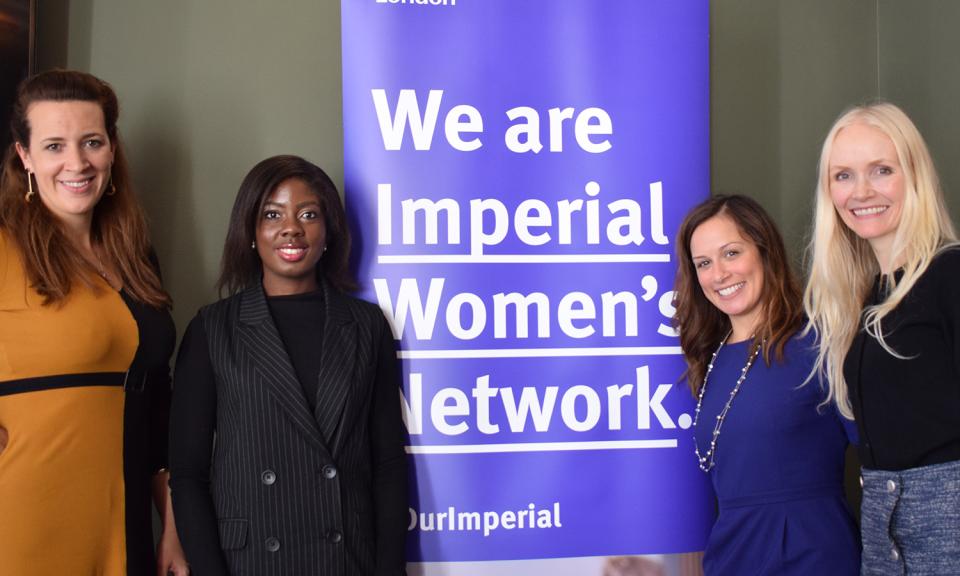
“Companies need to wake up to the fact that fundamental demographic changes are being driven by people, not technology or machines. Social change will drive the future of the workplace.” This was the view of Dr Eliza Filby, Generations Expert speaking to an audience of Imperial alumni, guests and students at the Imperial Women’s Network breakfast event (2 October).
Highlighting the four generations that currently make up the workforce, Eliza discussed how companies need to prepare for the fact this will become 5-6 generations in the coming years, bringing greater complexity to the work place.
Generational differences
From the Baby Boomers who are staying in work longer, to the ‘privileged’ Millennials questioning the traditional 9-5 working schedule since smart phones have blurred the lines between home and work. From the Generation Z who stay younger for later (‘kid-adulthood’), to the Generation X, the squeezed generation who dealt with the fallout of the financial crash and are managing an increase in care responsibilities. Each generation brings with them a different set of expectations and attitudes to the work place, and their career as a whole.
Future-proofing business
Eliza outlined the five key issues that need to be addressed by companies in the coming years, reflecting the changing demographic of the workforce:
-
Career-long learning
Companies will need to continuously upskill employees as technology and processes change. This is important to ensure the older generation remain relevant in the workplace, and key if they want to retain driven and ambitious younger employees. Learning can no longer be something that you do when you start a new job, it must be provided at all stages of your career. -
Multi-stage careers
The younger generations will change their careers 3-4 times. If companies want to retain the brightest and the best employees then need to be able to facilitate this change, providing challenging and diverse roles throughout the company. -
Agile working
Not only do employers want more flexibility in terms of location of work, hours and roles, there also needs to be a shift in working patterns to allow for greater cross-departmental sharing of knowledge and working. The current pattern tends to focus on silos, which doesn’t facilitate the most productive outcomes. -
Development of communication
The right to be heard, obliged to listen. Organisations need to facilitate generational dialogue so that no one is alienated, or feels that they can’t communicate properly. However this conversation also needs to be sensitive to the fact that different generations have different communication styles. Understanding these will aid cross-generational working. -
Caring responsibilities
As people are living longer there will be a rise in workers needing to look after parents. It will be necessary for people to take ‘care-leave’ along the same lines as maternity/paternity leave. Care-leave is going to be one of the biggest issues facing the workplace in the next ten years.
Aligning values
A shift is also taking place in the younger generations in terms of their attitude to their work. A job is no longer just a job, it is part of who they are and their purpose – it says something about who you are and your values. It has a more defining role in which people place greater personal and emotional investment.
Employers need to realise their employees are their brand ambassadors. To achieve this companies need to be more sensitive to individual needs and understand emotional intelligence. And although this might take more time and management, generations are working harder and longer than ever before, and it will help to create greater allegiance and loyalty.
Impact of education
Eliza discussed the increasing importance that education is playing. But it is women who are outstripping men at university. As the job market becomes more competitive what will be the impact on those who don’t have the same qualifications?
Another issue with university and post-graduate education is the widening divide between those who have parental financial support and those who don’t. As homes, education and childcare have become more expensive those without the financial support of their parents could be left behind, and where is the social safety net for them?
The future is flexible
Understanding the needs of the individual will be the key to a loyal, driven and hard-working workforce of the future. Recruiting and retaining Gen Z workers will require different skills and flexibility. “They are a generation who communicates via video, have an attention span of 8 seconds and are more influenced by social media than ever before. There will need to be an element of meeting in the middle from both sides to ensure a good working relationship. Future employers need to be mindful of their employee needs and flexible to their working preferences.”
This event was organised by the Imperial Women’s Network, whose aim is to provide a space for peer-to-peer professional and personal networking and support for female alumni, and those interested in advancing women’s leadership in business.
